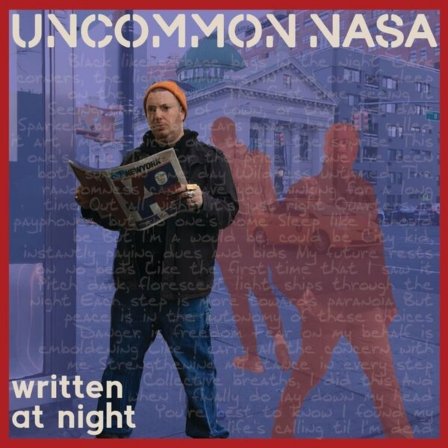It’s 11:47. A tiny fly from the soil of our Giant White Bird of Paradise pot lands on the touch-screen to no effect other than mild annoyance. A 50 lb. bag of play sand, recently procured from the Elmont Home Depot, shall soon seal the fates of him and all his cronies.
Uncommon Nasa does not have the kind of vocal tone that draws listeners in, but his voice is somehow peculiar; confident yet vulnerable, unaffected yet performative. Nor does he produce the kinds of beats that stop traffic, though there’s something immediately identifiable about them as well; whether crowded or open, they evince a stubborn meticulousness, almost algorithmically calculated, a steadiness to hedge any production risk. This is the man who coined the term “progressive hip-hop” to genrefy his music, the founder of the annual Yule Prog showcase, a stalwart of New York City’s independent hip-hop scene, and a man who went by Nasa until he rebranded himself by incorporating the name of his rap label into his rap moniker. He mixed and recorded a sizable portion of The Cold Vein among numerous other works of the early 2000s “underground” rap canon. He maintains a spreadsheet so you can see which ones. He’s lived in Staten Island for who knows how long and is the kind of character that only the City Who Never Sleeps could dream up.
It’s 12:55. Forget the flies. The Nicky Barnes episode of Mobsters is on. I wish the narrator of this show would chime in periodically throughout my workday. I initial a document. “The junk was good,” goes the voiceover. My computer lags. “But time was running out.” A cup of coffee then.
“Written at night, written in the rain/ When perception plays out, it’s no longer paranoia, it’s pain,” Nasa raps on “It’s Midnight/Grown Apart,” the album intro. “When perception plays out, it’s no longer paranoia, it’s pain,” he restates immediately, in case you missed it the first time. As a writer, Nasa doesn’t mince words. He chooses them, I imagine, like an experienced audio-engineer might pick plug-ins and effects from his sound banks, with a good idea of everything he needs, what it all does, and where it will end up, well in advance of its placement. “The silent fall/ It’s hard to be bigger in a world where everyone thinks they’re a skyscraper/ Who’s the Burj Khalifa/ Who’s just beneath the surface feeders waiting to snatch that leg,” Nasa raps on “Speak Your Truth,” the second of only two solo tracks on this, his first fully self-produced solo album.
It’s 1:45. We’re all out of coffee so I’m fading fast. Most nights, I miss insomnia, which feels to me like what old-timers with bum knees might call basketball, “a young man’s sport.” Then again…
The idea that there aren’t enough hours in the day is contingent upon the uniquely human notion that time exists as a coordinating tool of and for perception. Like dogs, artists who find themselves in the proverbial creative “zone” during late-night binges of expression know time only as a series of natural cycles characterized by darkness and a lack thereof — or, like cats, they know and don’t care. This is not uncharted territory for rap music; see Whodini and Kid Cudi for obvious thematic precedents Nasa might reject on general principle. (Some other rapper once said something about never sleeping, but he made it a hotline and they made it a hot song.) Following the opening solo cuts, Written At Night confronts the cliche of the restless writer alone with his thoughts by featuring additional scribes on every subsequent song. Still, many of their verses share in the nocturnal themes of isolation (“Ain’t heard my brother’s voice in a couple years,” Bronze Nazareth on “God’s Aim”), unfulfillment (“Killing each other but never saying thanks,” King Kashmere on “Small Change”) and gazing or wandering into the void (“The world ain’t over, but the rest sure is,” Mike Ladd on “Black Hole”).
Reached for comment, Nasa said:
I think there’s something magical about creating in the middle of the night, because you have more of the collective air space to yourself. It’s almost like a mystical online traffic, during the day it’s congested. Everyone is putting their thoughts out there, it’s a cacophony of ideas, some good can still come from it, but the ratios aren’t always the best. At night, it’s you and a few other creative or hard working people. The airwaves are cleaner, the ratio of good to bad ideas is maybe a bit better and more concentrated. That’s sort of how I see the album, it focuses on that overnight time energy that’s created by the select few and brought together. This record just brings us all together for a grander theme.
The conceit of a shadow realm populated with the collective dreams of those woke is very Rod Serling, and indeed Nasa has cited that icon of anthological storytelling as a major influence. Less Twilight Zone, more Night Gallery, Written at Night is a guided tour through a painstakingly curated hall of ideas, each song another scene within a frame, each still image waiting to come to life.
It’s 3:30. I think I’m done here.
More about: Uncommon Nasa



